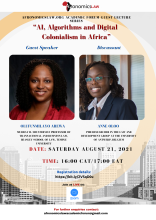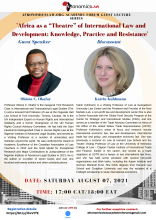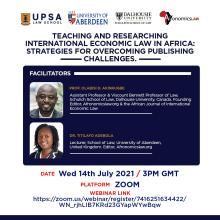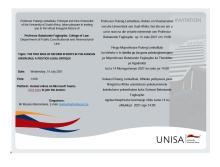International Law
Call for Contributions: Symposium on Early Career International Law Academia
September 14, 2021
Derby Law School presents a One-day Workshop themed "Generating a future for Sustainable Development Goals (SDGs) in a post COVID-19 Pandemic World"
August 18, 2021
This one-day workshop will investigate, discuss, and consider new sustainable avenues to achieve SDGs in the wake of the Covid-19 pandemic. Some of the possible side effects of the pandemic will be felt on the actualisation of the sustainable development goals (SDGs) especially in developing countries especially as the UK government has announced cuts to foreign aid.
Date: 9th September 2021
Afronomicslaw.org Academic Forum Guest Lecture Series: AI, Algorithms and Digital Colonialism in Africa
Call for Papers - Sanctions and Africa: An International Law and Politics Conference
The Role of International Soft Law in Tax Reform: Multilateralism at the Seams
Afronomicslaw.org Academic Forum Guest Lecture Series: Africa as a "Theatre" of International Law and Development: Knowledge, Practice and Resistance
August 5, 2021
The Afronomicslaw.org Academic Forum invites you to join their next guest lecture series.
Title
Africa as a “Theatre” of International Law and Development: Knowledge, Practice and Resistance
Date: Aug 7, 2021
Time: 17:00 CAT/ 18:00 EAT
The Lagos Chamber of Commerce International Arbitration Centre (LACIAC) presents Africa Energy Arbitrators' Forum Preliminary Training and Competition, 2021
August 2, 2021
The AEA-Prelim Training and Competition 2021
Webinar: Teaching and Researching International Economic Law in Africa, Strategies for Overcoming Publishing Challenges
July 2, 2021
International economic law is an emerging area of teaching, research, and practice in Africa. The area, which is a sub-field of international law, is concerned with the regulation of economic relations between states as well as the conduct of private parties involved in cross-border economic and business transactions.
University of South Africa presents Professor Babatunde Fagbayinbo's Inaugural Lecture themed: "The Two Eras of Reform Efforts in the African Union (AU): A Politico-Legal Critique"
July 2, 2021
Professor Puleng LenkaBula, Principal and Vice Chancellor of the University of South Africa, takes pleasure in inviting you to the virtual Inaugural lecture of:
Professor Babatunde Fagbayibo, College of Law: Department of Public Constitution and International Law
Topic: The Two Eras of Reform Efforts in the African Union (AU): A Politico-Legal Critique



